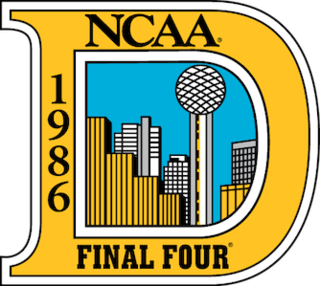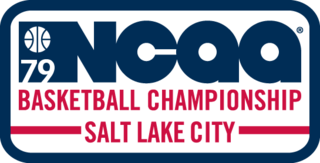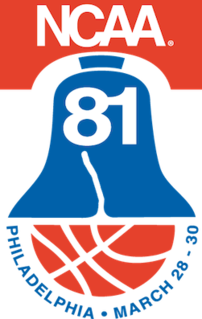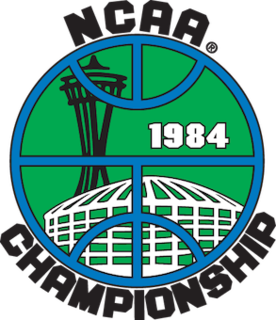The TVS Television Network, or TVS for short, is a syndicator of American sports programming. It was one of several "occasional" national television networks that sprang up in the early-to-mid-1960s to take advantage of the establishment of independent television stations and relaxation of the AT&T Long Lines usage rates.

The 1982 NCAA Division I men's basketball tournament involved 48 schools playing in single-elimination play to determine the national champion of men's NCAA Division I college basketball. It began on March 11, 1982, and ended with the championship game on March 29 in the Louisiana Superdome in New Orleans, Louisiana. A total of 47 games were played.

The 1975 NCAA Division I Basketball Tournament involved 32 schools playing in single-elimination play to determine the national champion of men's NCAA Division I college basketball. It began on March 15, 1975, and ended with the championship game on March 31 at the San Diego Sports Arena, now known as Pechanga Arena San Diego, in San Diego, California. A total of 36 games were played, including a third place game in each region and a national third place game. This was the first 32-team tournament.

The 1986 NCAA Division I men's basketball tournament involved 64 schools playing in single-elimination play to determine the national champion of men's NCAA Division I college basketball. It began on March 13, 1986, and ended with the championship game on March 31 in Dallas, Texas. A total of 63 games were played.
The 1968 NCAA University Division Basketball Tournament involved 23 schools playing in single-elimination play to determine the national champion of men's NCAA Division I college basketball. It began on March 8, 1968, and ended with the championship game on March 23 in Los Angeles, California. A total of 27 games were played, including a third place game in each region and a national third place game.
The 1970 NCAA University Division Basketball Tournament involved 25 schools playing in single-elimination play to determine the national champion of men's NCAA Division I college basketball. It began on March 7, 1970, and ended with the championship game on March 21 in College Park, Maryland. A total of 29 games were played, including a third place game in each region and a national third place game. This tournament was notable for the number of small schools that reached the Sweet 16, Elite 8, Final 4, and Championship Game. Another notable aspect of the tournament was that Marquette became the first team to turn down an announced NCAA Tournament bid for the National Invitation Tournament. Coach Al McGuire took issue with being seeded in the Midwest regional instead of the geographically closer Mideast. They were replaced in the field by Dayton. As a result of this action, the NCAA forbid its members from playing in other postseason tournaments if offered an NCAA bid.

The 1972 NCAA University Division Basketball Tournament involved 25 schools playing in single-elimination play to determine the national champion of NCAA University Division college basketball. It began on Saturday, March 11, and ended with the championship game in Los Angeles on Saturday, March 25. A total of 29 games were played, including a third place game in each region and a national third place game.

The 1973 NCAA University Division Basketball Tournament involved 25 schools playing in single-elimination play to determine the national champion of men's NCAA University Division college basketball. It began on Saturday, March 10, and ended with the championship game on Monday, March 26, in St. Louis, Missouri. A total of 29 games were played, including a third place game in each region and a national third place game.

The 1977 NCAA Division I Basketball Tournament involved 32 American schools playing in single-elimination play to determine the National Champion of Men's NCAA Division I college basketball. It began on Saturday, March 12, 1977, and ended with the championship game on Monday, March 28 in Atlanta. A total of 32 games were played, including a national third place game. This was the final tournament in which teams were not seeded.

The 1978 NCAA Division I Basketball Tournament involved 32 schools playing in single-elimination play to determine the national champion of men's NCAA Division I college basketball. It began on March 11, 1978, and ended with the championship game on March 27 in St. Louis, Missouri. A total of 32 games were played, including a national third place game.

The 1979 NCAA Division I Basketball Tournament involved 40 schools playing in single-elimination play to determine the national champion of men's NCAA Division I college basketball. It began on March 9 and ended with the championship game on March 26 in Salt Lake City. A total of 40 games were played, including a national third-place game. This was the tournament's only edition with forty teams; the previous year's had 32, and it expanded to 48 in 1980. The 1979 Indiana State team was the most recent squad to reach a national title game with an undefeated record, holding that distinction for 42 years until the 2021 Gonzaga Bulldogs team won a 93-90 OT national semifinal over UCLA to reach the 2021 title contest vs. Baylor with a 31-0 record.

The 1980 NCAA Division I Basketball Tournament involved 48 schools playing in single-elimination play to determine the national champion of men's NCAA Division I college basketball. It began on March 6th, 1980, and ended with the championship game on March 24th at Market Square Arena in Indianapolis. A total of 48 games were played, including a national third-place game.

The 1981 NCAA Division I Basketball Tournament involved 48 schools playing in single-elimination play to determine the national champion of men's NCAA Division I college basketball. It began on March 12, 1981, and ended with the championship game on March 30 in Philadelphia. A total of 48 games were played, including a national third place game. It was also the last tournament to be televised on NBC, before CBS took over the following year. Additionally, it was the last season in which the NCAA sponsored championships only in men's sports; the first Division I Women's Tournament would be played the following year.

The 1983 NCAA Division I men's basketball tournament involved 52 schools playing in single-elimination play to determine the national champion of men's NCAA Division I college basketball. It began on March 17, 1983, and ended with the championship game on April 4 at The Pit, then officially known as University Arena, on the campus of the University of New Mexico in Albuquerque. A total of 51 games were played.

The 1984 NCAA Division I men's basketball tournament involved 53 schools playing in single-elimination play to determine the national champion of men's NCAA Division I college basketball. It began on March 13, 1984, and ended with the championship game on April 2 in Seattle. A total of 52 games were played. This was the last tournament in which some teams earned first-round byes as the field expanded to 64 teams beginning in the 1985 tournament when each team played in the first round. It was also the second year with a preliminary round; preliminary games would not be played again until 2001.

The 1985 NCAA Division I men's basketball tournament involved 64 schools playing in single-elimination play to determine the national champion of men's NCAA Division I college basketball. This was the first year the field was expanded to 64 teams, from 53 in the previous year's tournament. It began on March 14, 1985, and ended with the championship game on April 1 in Lexington, Kentucky. A total of 63 games were played.

In men's college basketball, the Game of the Century was a historic National Collegiate Athletic Association (NCAA) game between the Houston Cougars and the UCLA Bruins played on January 20, 1968, at the Astrodome in Houston, Texas. It was the first NCAA regular season game broadcast nationwide in prime time. It established college basketball as a sports commodity on television and paved the way for the modern "March Madness" television coverage.

The UCLA Bruins men's basketball program represents the University of California, Los Angeles in the sport of men's basketball as a member of the Pac-12 Conference. Established in 1919, the program has won a record 11 NCAA titles. Coach John Wooden led the Bruins to 10 national titles in 12 seasons, from 1964 to 1975, including seven straight from 1967 to 1973. UCLA went undefeated a record four times. Coach Jim Harrick led the team to another NCAA title in 1995. Former coach Ben Howland led UCLA to three consecutive Final Four appearances from 2006 to 2008. As a member of the AAWU, Pacific-8 and then Pacific-10, UCLA set an NCAA Division I record with 13 consecutive regular season conference titles between 1967 and 1979 which stood until passed by Kansas in 2018. UCLA is scheduled to join the Big Ten Conference in 2024.

The 1970–71 UCLA Bruins men's basketball team won the National Collegiate Championship on March 27, 1971, in the Astrodome in Houston, Texas. It was UCLA's fifth consecutive national title, and seventh in eight years under head coach John Wooden. The Bruins defeated Villanova 68–62, but the Wildcats' runner-up finish was later vacated by the NCAA.

The 1970–71 NCAA University Division men's basketball season began in December 1970, progressed through the regular season and conference tournaments, and concluded with the 1971 NCAA University Division Basketball Tournament Championship Game on March 27, 1971, at the Astrodome in Houston, Texas. The UCLA Bruins won their seventh NCAA national championship with a 68–62 victory over the Villanova Wildcats.














